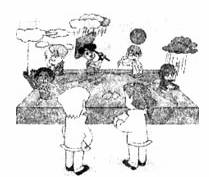题目内容
10、Would you please me?
A.not trouble B.not to trouble C.to not trouble D.not troubling
试题答案
10、B
Would you please ________?
[ ]
情境交际 从各题的四个选项中选出一个最佳答案。
1.—________
— Not bad.
A.How old are they? B.Judy doesn’t like thrillers at all.
C.Where do you have breakfast? D.What do you think of the salad?
2.—________
—No.What terrible weather!
—Yeah.Rain again.

A.Not very nice weather, is it? B.How are you today?
C.What’s the weather like today? D.Is it terrible weather?
3.—Would you like an ice-cream? Or some bread perhaps?
— ________, please.
—Just a minute.
A.I choose neither B.Ice cream C.Thanks D.Bring me bread
4.—This suitcase is really heavy, and my back is giving me a lot of trouble!
— ________
—That’s very kind of you.
A.You’re welcome. B.Never mind. C.Certainly. D.Shall I carry it?
5.—I’m not sure what to do this evening.Any ideas?
— ________
—Good idea.

A.How about going to the cinema? B.I agree.
C.You never go shopping. D.You mustn’t go to the park.
查看习题详情和答案>>
In English, just like in Chinese, we change the way we speak when talking with different people. The expressions you use might depend on whom you are speaking to or how well you know them. If you say to your teacher, “Where is my book?” this will sound rude. But if you say, “Excuse me, Mr West. Do you know where my book is?” your question will sound much more polite. On the other hand, it might be alright to say “Where is my book?” to the people you know well.
And you would not usually say, “Peter, lend me your pen.” A very direct order like this can sound rude in English. Usually in English polite questions are longer and include extra (附加的) language, such as “Could you please...?” or “Can I ask...?” It sounds more polite to say, “Peter, could you please lend me your pen?” If you stop a stranger in the street, we might first say, “Excuse me. I wonder if you can help me.” or “I’m sorry to trouble you but…” before asking him for help.
It might seem that speaking politely is more difficult than being direct, and in a way this may be true.
小题1:When we make requests, we need to speak in a ____ way.
| A.polite | B.careful | C.different | D.direct |
| A.Which is the way to the zoo? |
| B.How can I get to the zoo? |
| C.Do you know the way to the zoo? |
| D.Excuse me. Can you tell me the way to the zoo? |
| A.We should use long sentences when we ask for information and help. |
| B.When we ask for help from others, polite language must be used. |
| C.The way of speaking is important when we ask different people for help. |
| D.In English, polite questions are as neccessary as rude and direct ones. |
| |||||||||||||||||||||||||||||||||||||||||||||||||||||||||||||||||||||||||
情境交际从各题的四个选项中选出一个最佳答案。

1.--________
--Not bad.
A.How old are they?
B.Judy doesn't like thrillers at a11.
C.Where do you have breakfast?
D.What do you think of the salad?
2.--_________
--No.What terrible weather!
--Yeah.Rain again.
A.Not very nice weather, is it?
B.How are you today?
C.What's the weather like today?
D.Is it terrible weather?
3.--Would you like all ice—cream? Or some bread perhaps?
--______,please.
--Just a minute.
A.I choose neither B.Ice-cream C.Thanks D.Bring me bread
4.--This suitcase is really heavy, and my back is giving me a lot of trouble!
--That's very kind of you.
A.You're welcome. B.Never mind.
C.Certainly. D.Shall I carry it?
5.--I’m not sure what to do this evening.Any ideas?
--Good idea.
A.How about going to the cinema? B.I agree.
C.You never go shopping. D.You mustn't go to the park.
查看习题详情和答案>>
| |||||||||||||||||||||||||||||||||||||||||||||||||||||||||||||||||||||||||||||||||||||||||||||||||||||||||||||||||||||||||||||||||||||||||||||||
Shopkeeper: S Mrs. Green: G
S: Good morning, Mrs. Green.____1____
G: We've finished all the drinks. Could you show me those large bottles of Coca Cola?
S: ____2____
G: May I have two boxes?
S: Of course, but there aren't enough on the shelf here. Would you please wait for a minute? I'll go up stairs and get some more for you.
G: ____3____
S: Not at all. I'll be back very soon.
G: No hurry. (The shopkeeper came back)
S: ____4____
G: Not at all.
S: Here you are, Mrs. Green.
G: That's a lot for bringing them down.
S: ____5____ Do you need anything else?
G: No, thanks. Good bye.
S: Bye. Mrs. Green. ( )
A.How much do they cost?
B.Sorry to keep you waiting.
C.I'm sorry to trouble you so much.
D.It's my pleasure.
E. What can I do for you?
F. Sure. I'd be glad to.
G. Shall I send them to your home?
查看习题详情和答案>>
阅读理解
Han Meimei has read something with the colour words in them. She doesn't understand what they mean. So she went to her teacher, Mrs Green, for help. Here is what they are talking about:
Meimei: Good morning, Mr Green. Have, you got a moment?
Green: Yes. What can I do for you, Meimei?
Meimei: I've come to some sentences that I don't understand. Can you help me?
Green: What are they?
Meimei: They are words of colour in these sentences on this list :
(1) Jack is blue today.
(2) She's yellow.
(3) He's told a white lie (谎言).
(4) Tom has a green thumb (大拇指).
Green: In everyday English the word blue means sad. Yellow means afraid sometimes. A person with a green thumb usually grows plants well. When you tell a white lie, you mean not to trouble someone too much. A white lie is not a bad one.
Meimei: Would you please give me an example of “a white lie”?
Green: Certainly. If I give you a cake and you don't like it, you won't say that you don't like it. Instead you'll say that you are not hungry. That's a white lie.
Meimei: I see. Thank you very much.
1.In everyday English, words of colour sometimes do not mean ________.
[ ]
2.The sentence “Jim has a green thumb” means ________.
[ ]
3.Someone is blue when he has ________.
[ ]
A.got some good news
B.heard that his best friend has been killed in an accident
C.been given a nice and blue suit
D.nothing to eat but rather hungry
4.Which of the following can be a white lie?
[ ]
A.Miss Forgetful has broken a beautiful glass but she doesn't say so.
B.Ron likes the fried chicken and says that he hopes to eat some of it.
C.Jill forgot to do the lessons but she said that she was ill last night.
D.The old doctor's daughter told him that all the people in the town were well because she did not want to hurt him.
查看习题详情和答案>>